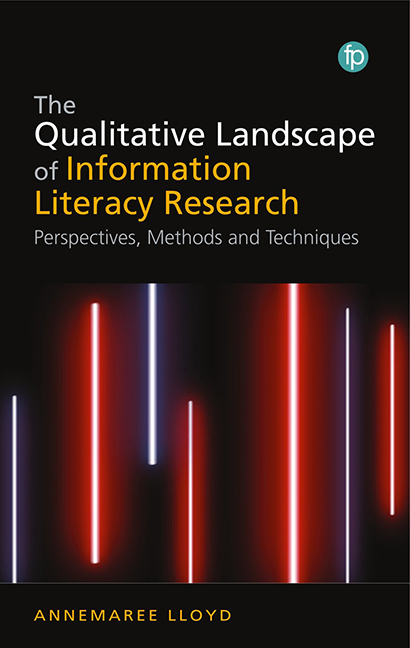Book contents
- Frontmatter
- Contents
- Figures
- Foreword
- Acknowledgements
- Introduction: The Qualitative Landscape of Information Literacy Research
- Chapter 1 Situating Information Literacy Research
- Chapter 2 Informing Information Literacy Research
- Chapter 3 Framing Information Literacy as an Educational Practice for Research. Learning Theories and Models
- Chapter 4 Qualitative Methods in Information Literacy Research
- Chapter 5 Collecting Data About Information Literacy: Data Collection Techniques
- Chapter 6 Planning for Research
- Chapter 7 Qualitatively Speaking and Doing Information Literacy Research
- References
- Index
Chapter 2 - Informing Information Literacy Research
Published online by Cambridge University Press: 21 October 2021
- Frontmatter
- Contents
- Figures
- Foreword
- Acknowledgements
- Introduction: The Qualitative Landscape of Information Literacy Research
- Chapter 1 Situating Information Literacy Research
- Chapter 2 Informing Information Literacy Research
- Chapter 3 Framing Information Literacy as an Educational Practice for Research. Learning Theories and Models
- Chapter 4 Qualitative Methods in Information Literacy Research
- Chapter 5 Collecting Data About Information Literacy: Data Collection Techniques
- Chapter 6 Planning for Research
- Chapter 7 Qualitatively Speaking and Doing Information Literacy Research
- References
- Index
Summary
Introduction
Why do we need theory in information literacy research? Theory is an important element of research work, because it scaffolds the development, implementation, analysis and interpretation of research results and findings. While paradigms describe the world view, theory provides the clusters of concepts, problems and methodologies that the researcher will employ to help explain and describe the phenomena being studied. Understanding theory and how it is used in research is a critical skill for all information literacy researchers. It provides knowledge that enables the researchers to judge the veracity of the research design of the studies that might be used for background scoping. Theoretical perspectives also provide insight which guides the interpretation and explanation of findings.
The work of theoretical frameworks
A theoretical framework represents a structure of concepts and ideas, which guide a study and establishes its rationale. Theoretical frameworks:
• make explicit our assumptions and beliefs (our ontology and epistemology), which frame our research questions
• scaffold our decisions about methodology and focus areas for attention.
Consequently, it is important to understand research paradigms and theoretical perspectives. While sometimes not always explicitly stated there are a number of theoretical concepts, which are referenced in qualitative information literacy research.
Foundational sociocultural theories used in qualitative information literacy research
Sociocultural theories (Hicks, 2018a; Lloyd, 2012; Wang, 2007) describe a broad family of theories that focus on how the social world is shaped, mediated and experienced through the interactions of people and material objects located in similar contextual situations (in situ). These theories tend to suggest that knowledge is relational. Sociocultural theories attempt to explain the role of mediation in the construction, reconstructions and transformation of meaning. This approach places an emphasis on shared ways of interacting and communicating. From this perspective, information literacy is viewed as something that is constructed and emerges in social contexts (e.g. workplace, schools, higher education settings, sporting grounds, music).
The following section, though not exhaustive, describes some of the core social theories that have framed qualitative research in information literacy over the last 47 years. Note, they are not in any specific order of importance.
- Type
- Chapter
- Information
- The Qualitative Landscape of Information Literacy ResearchPerspectives, Methods and Techniques, pp. 19 - 32Publisher: FacetPrint publication year: 2021



